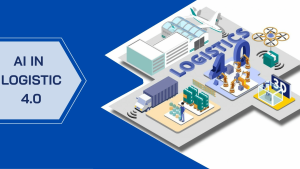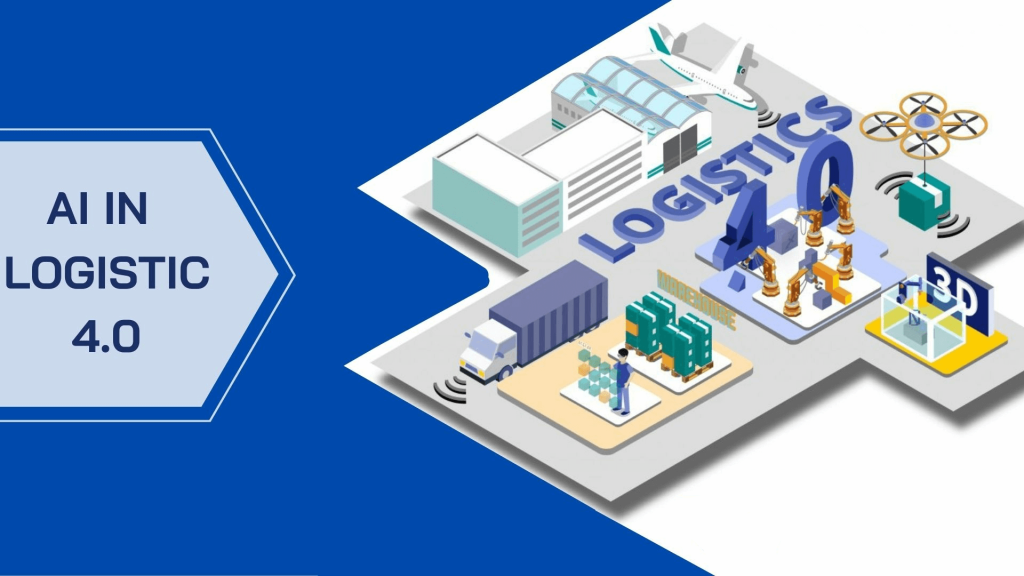Artificial intelligence (AI) technology plays a crucial role in logistics, offering significant potential and benefits to the industry. It enhances operational efficiency, predicts demand, manages risks, improves customer experience, and reduces costs. With the continuous development of AI technology, the logistics industry will continue to improve and advance in the future. Below is an assessment of AI technology in the logistics sector for the future.
AI optimizes supply chain management
Have you ever imagined a day when robots replace humans in managing the supply chain? This is not just a fictional imagination but has become a reality thanks to artificial intelligence.
Due to its superior information processing capabilities, AI allows us to automate the entire process from when goods are produced until delivery. Robots can receive customer requests and automatically coordinate related processes, from warehousing, quality inspection, and packaging to transportation. Not only does it save time and human effort, but the combination of robots and AI also brings high accuracy and minimizes errors in supply chain management.
Particularly, by analyzing data from millions of transactions, AI can provide insights and forecasts on resources, inventory status, and transportation progress to help supply chain managers make strategic decisions. Thanks to the integration of robots and AI, the supply chain is optimized in a flexible, rapid, and efficient manner.
Enhancing transportation efficiency
The ability of AI to analyze and process vast amounts of data from transportation information systems helps companies easily track and manage their delivery operations. By collecting, classifying, and applying data, AI provides logistics operators with a comprehensive view of the transportation process to implement improvements and optimization.
Simultaneously, AI is used to optimize transportation planning. Through machine learning and intelligent algorithms, AI can automatically calculate and optimize the supply chain, from vehicle allocation and selecting the optimal routes to determining the most efficient delivery times and distances. This minimizes traffic delays or unexpected incidents, thereby enhancing transportation efficiency and reducing costs for businesses.
Moreover, AI can also be applied in forecasting and risk management. By continuously collecting information from monitoring devices (IoT), AI can predict potential issues like vehicle breakdowns or late deliveries, preventing them from affecting the supply chain. Additionally, this technology helps analyze logistics trends and patterns to implement preventive measures and adjust transportation plans flexibly.
Automating the delivery process with AI
In this context, automating the delivery process has significantly improved efficiency and minimized errors for companies. An application of AI in automating delivery processes is using machine learning to classify parcels based on their characteristics and transportation requirements. Its dexterity allows for quickly identifying product types and finding optimal transportation methods to save time and costs.
Furthermore, AI is applied to coordinate transport vehicles through automated algorithms. Instead of relying on humans to schedule and call vehicles, AI systems can automatically determine the most efficient transport schedules. This not only saves time but also minimizes risks and enhances responsiveness to customer demands.
AI supports demand forecasting and production planning
In the logistics industry, AI plays a vital role in demand forecasting and production planning. AI uses complex algorithms to analyze data related to current and past sales, thus predicting future demand. This helps logistics companies adjust their production plans more flexibly and accurately.
With the support of AI, demand forecasting and production planning become automated and time-saving. This technology not only minimizes human errors but also enhances employee productivity. Thanks to its rapid information processing capability, AI can categorize goods based on factors like product type, volume, or size, helping to rearrange the warehouse scientifically and save space.
AI is a critical tool in making optimal decisions for warehouse management. In recent years, AI has been integrated into warehouse management systems to automate inventory checks, track the location of each item, and search for product details when necessary. This technology enhances work efficiency and minimizes human errors

Optimizing warehouse management with AI
Most people may think that warehouse management is a dull, tedious, and uninteresting job. However, the truth is quite the opposite! Warehouse management can be one of the most complex and challenging tasks in logistics. That’s why optimizing warehouse management has become a notable trend for modern businesses.
Optimizing warehouse management helps logistics companies save both time and costs. By applying intelligent algorithms to determine suitable locations for each type of goods, businesses can maximize warehouse space and shorten product search times. Additionally, organizing the warehouse efficiently also increases the ability to adapt to customer requests.
Furthermore, optimizing warehouse management provides flexibility in order processing. With AI technology, businesses can automatically determine the appropriate transportation process and quickly plan deliveries. This not only saves time but also increases employee productivity, thereby enhancing service quality and competitiveness in the logistics industry.
Smart warehouse management has become an important factor in increasing competitiveness for companies in the logistics sector. With the continuous development of AI technology, we can believe that the future of warehouse management will bring remarkable progress. Get ready for a revolution in warehouse management!
Market demand forecasting
Accurate demand forecasting is crucial for effective supply chain management. Without accurate forecasts, third-party logistics providers may face major issues like stock shortages or excess inventory. AI makes demand forecasting easier by identifying demand patterns and generating predictions based on historical data analysis—a process that would be time-consuming and costly if done manually.
Research from McKinsey has shown that companies using AI-based forecasting can reduce errors by 20-50%, leading to a 65% reduction in lost revenue and out-of-stock products.
However, supply chain experts should not rely solely on AI. Forecasting still requires a deep human understanding to make the most accurate decisions. While AI algorithms can be a powerful tool in the supply chain, ensuring accurate predictions based on data requires supply chain managers to learn how to configure tools correctly, select appropriate algorithms, and continuously analyze results.
Risk management
Thanks to its predictive capabilities, AI can help businesses identify potential risks in the supply chain. For example, if AI models predict upcoming unstable weather or political situations, they can suggest risk mitigation strategies for companies to analyze and act upon.
Additionally, when businesses use AI for equipment maintenance, this tool can implement predictive maintenance strategies and determine when machinery needs inspection. This allows the operations department to plan for downtime and increase reliability through proactive maintenance.
Warehouse layout design
Another safe application of AI in logistics is its use in optimizing pick paths within the warehouse. The goal is to optimize space and enhance efficiency. Many businesses have begun applying AI in their order fulfillment centers, such as using autonomous robots and humans together to pick products faster. A leading logistics company even increased productivity by 30% and reduced operational costs using AI in their picking process.
Conclusion
In general, the groundbreaking applications of AI in the logistics industry, as mentioned above by Interlink, have been enhancing efficiency and convenience for freight companies. With the rapid advancement of technology, we can trust that in the near future, AI will continue to play an important role and bring exceptional benefits to this industry.
—————————— Thanks for enjoy our news ——————————–



